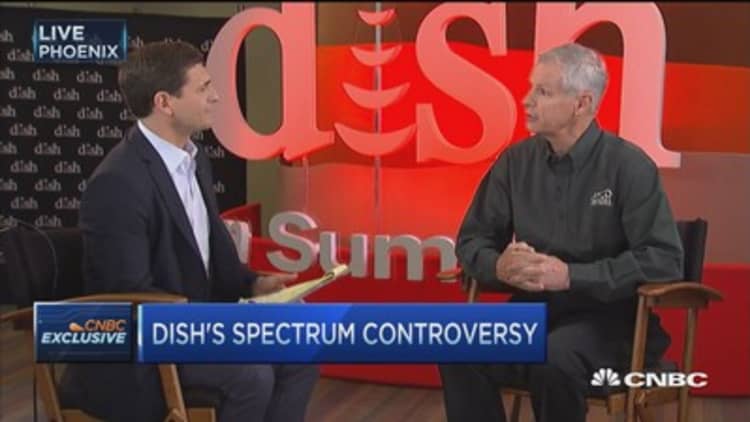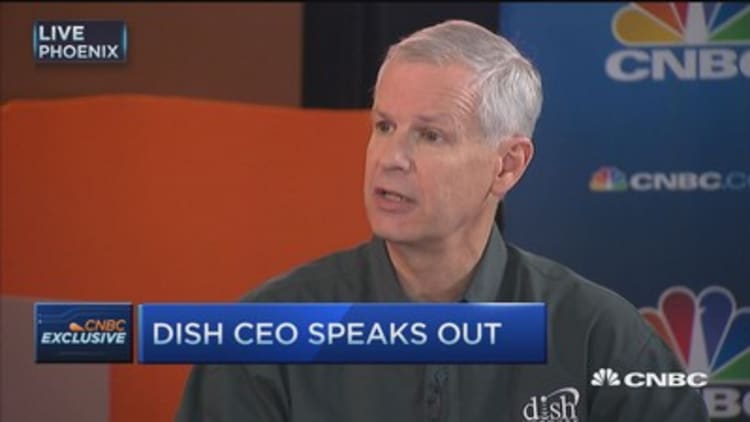
Dish Network's purchase of wireless spectrum has raised the hackles of some competitors, but Chairman and CEO Charles Ergen said Thursday the U.S. taxpayer benefited from his company's participation in the government auction.
At issue is the $3.3 billion discount Dish and its partners received by making their bids through smaller companies known as designated entities.
"The big headline is, well that's a loss to the taxpayer, and that's a pretty easy headline if you look at it on a very superficial level," he said in an interview on "Squawk on the Street."
"But the other side of that, the people who really know about auctions and really understand these things and actually take a closer look at it realize that this auction generated $20 to $25 billion more for the U.S. Treasury in terms of value," he said. "Most people thought this auction would be $10, $15, maybe $20 billion."
Read More Why we sold to Verizon: AOL's Tim Armstrong
The partners led by Dish spent $13.3 billion to acquire wireless licenses in the most recent auction of government-owned spectrum. The Federal Communications Commission raised a record $44.9 billion in the auction.
Dish was likely responsible for raising the value of the auction by $20 billion by breaking the control over the process rivals AT&T and Verizon had in the past, Ergen said.
"So if you take the $3 billion discount off of that, do the math. Somewhere between $15 and $20 billion, the taxpayer made more because of our participation," he said. "Overall, when you study the matter, the Treasury made way more money."
The No. 2 U.S. satellite television company already owned significant wireless licenses, but has long kept its plans for the spectrum under wraps.
Following standard procedure, FCC officials said they would scrutinize the details of legal and financial ties of those separate companies to Dish and other corporations to ensure their independent operations.
Read More Broadcast still best bet for advertising: CBS CEO
Ergen said he believed Dish would prevail in the matter, noting that the designated entity structure has been attacked many times since it was instituted in 1994. He added that all five FCC commissioners chose not to limit the discount available to designated entities.
"I don't believe you can change the rules and move the goal post after the auction," he said. "I think we followed the rules. I think there's some sour grapes."
The Dish chief said the company will get in the wireless business in some form or fashion, but was not exactly sure how yet.

The move to wireless is widely seen as a way for the company to offset declines in its business as more customers transition to streaming video alternatives known as over-the-top services or opt for so-called skinny packages with less content and lower prices.
On Monday, Dish reported a 3.6 percent rise in quarterly revenue as it earned more per user in its core pay-TV business, making up for a fall in subscribers.
Dish, which raised prices in February, said net pay-TV subscribers fell by about 134,000 in the first quarter, bringing its total base to 13.84 million.
The company blamed the subscriber losses on blackouts of some channels due to disputes with media companies including Time Warner's Turner Broadcasting, 21st Century Fox and other local network affiliates.
Read MoreCord-cutters: Why it's Apple's new key demographic
However, Ergen acknowledged on "Squawk on the Street" that more Americans are becoming cord cutters, a transition that is being hastened by the wealth of over-the-top options now available.
"The model of, 'Are you going to keep a customer for the next 10 years?' probably doesn't exist anymore because the customer has so many options and the technology keeps changing," he said. "So when you don't keep the customers long, your model changes."
Under the new model, companies need a higher-paying customer with better credit, he said, adding that Dish will focus on rural America where its base is located and there is less competition.
Dish's Sling TV, which offers live streaming for a limited number of channels and launched in February, is becoming a more important part of its portfolio of services, Ergen said.
The platform takes some of the pain points of traditional cable and satellite subscriptions, he added, but Dish is still working through the challenges of delivering content via multiple devices and honoring contracts with content companies that either allow or prohibit certain services.
—Reuters contributed to this story.


